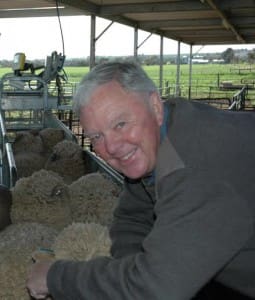Former Sheep CRC chairman Dr John Keniry has been a key figure in attracting collaborating partners for the research body’s next five-year research agenda, his successor Duncan Fraser said today.
The former National Farmers Federation president said one of Dr Keniry’s great skills is his unique ability to bring different personalities and organisations together to work towards a common cause.
“It’s a privilege to take over the role from a man of his standing, who has shown great dedication and made a lasting contribution to the industry.”
Dr Keniry this week leaves his post as chairman of the Sheep CRC, leaving behind him an organisation that has delivered transformative technology that will drive productivity in the industry for years to come, a Sheep CRC statement said.
Dr Keniry has served as board chairman of the Cooperative Research Centre for Sheep Industry Innovation (Sheep CRC) for the past seven years, during which time it has delivered game-changing tools including DNA testing for hard to measure genetic traits like meat eating quality, and comfort measurement tools to support the sale of Merino wool garments, the CRC said.
Sheep CRC success due to research objectives focus
Dr Keniry said the key to the organisation’s success had been its unwavering focus on delivering against its research objectives, which would not have been possible without strong corporate governance procedures.
“The results of the Sheep CRC have demonstrated the benefits of the Commonwealth’s Cooperative Research Centre (CRC) program, which requires a very clear plan about what is to be achieved for an industry and an independent skills-based board to oversee its delivery without interference from agri-politics.”
Operating as part of the Federal Department of Industry’s CRC program, the Sheep CRC is a collaboration of 38 participants from industry, government and the commercial sector. It is working to increase the productivity and profitability of the industry through adoption of new technologies in both the meat and wool supply chains.
“Most of what the Sheep CRC has done over the last seven years fits with the maxim of ‘what gets measured gets managed,” Dr Keniry said.
“The CRC’s research has facilitated improvement in all aspects of the sheep industry through better measurement of meat eating quality, wool comfort and the genetic merit of individual animals.
“The CRC is now well-positioned in the area of meat science by bringing the processing sector into collaboration with producers and retailers in researching new ways to improve meat quality,” he said.
Sheep CRC genomics program to drive productivity
Dr Keniry said the Sheep CRC’s genomics program, and in particular the DNA tests for hard to measure traits, is a real step-change in the way genetics will have an impact at the flock level and will drive major productivity improvements in the industry.
“And the Wool ComfortMeter and Wool HandleMeter are revolutionary tools that will provide objective data to processors and retailers to support the sale of superfine wool garments.”
Dr Keniry said the Sheep CRC had also invested heavily in communication and training programs to ensure there was good awareness and a high level of adoption of the new tools and technology.
“I leave knowing that the organisation is in good hands with Duncan at the helm and our outstanding CEO James Rowe beside him, and I wish them all the best for their next phase of research,” Dr Keniry said.
“I’d especially like to thank my fellow directors and the CRC’s program leaders who have done such a wonderful job in delivering research outcomes that will benefit the industry for years to come.”
The Sheep CRC’s research program for the next five years is built around three key areas: to enhance management of sheep wellbeing and productivity; to introduce value-based trading of sheepmeat; and to deliver new and affordable DNA-based genetic tools.


HAVE YOUR SAY